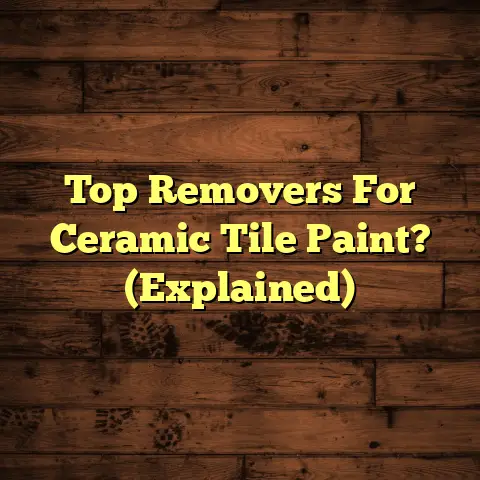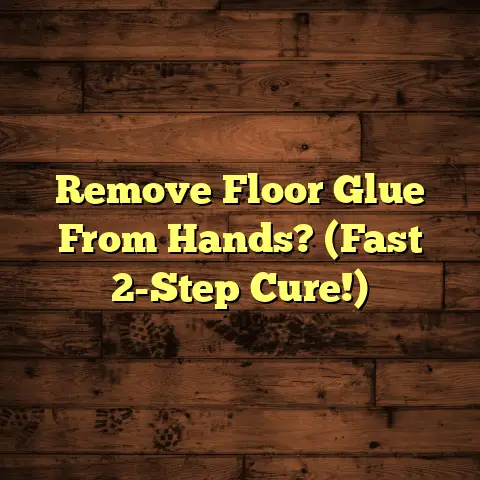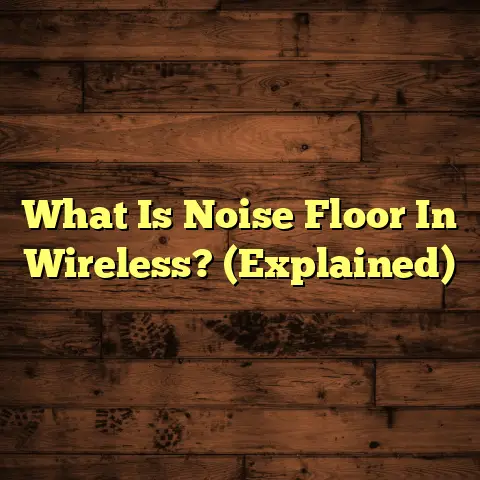Pro Hardwood Polishing: Is It Worth It? (Cost = Shine?)
(Cost = Shine?)
Imagine this: You walk in after a crazy day.
The aroma of your favorite brew fills the air.
Then, your feet meet the warm, inviting embrace of your hardwood floor.
The rich tones gleam, catching the light just right.
It’s more than just a floor; it’s a feeling.
A feeling of home, of memories, of comfort.
But what happens when that feeling fades?
When the shine dulls and the luster is lost?
You might be asking yourself: is it time for professional hardwood polishing?
Or can I get that sparkle back on my own?
Let’s dive into the world of hardwood floors and find out!
Understanding Hardwood Floors
As a flooring contractor for over 15 years, I’ve seen it all when it comes to hardwood.
From classic oak to exotic Brazilian cherry, each type has its own personality.
And that personality is heavily influenced by the finish applied.
Types of Wood and Their Impact
-
Oak: The workhorse. Durable, readily available, and takes stain well.
-
Maple: A tighter grain, lighter color, and can be a bit trickier to stain evenly.
-
Hickory: Known for its strength and distinctive grain patterns.
-
Brazilian Cherry (Jatoba): Incredibly hard and naturally reddish-brown.
The Janka hardness scale measures the resistance of wood to denting and wear.
Oak typically sits around 1290, while Brazilian Cherry clocks in at a whopping 2350!
Finishes and Their Role
-
Polyurethane: The most common. Durable, water-resistant, and available in various sheens (gloss, semi-gloss, satin, matte).
-
Oil-Based Polyurethane: Offers a warm, amber hue and excellent durability.
-
Water-Based Polyurethane: Clearer finish, dries faster, and lower VOCs (volatile organic compounds).
-
Penetrating Oil Finishes (e.g., Tung Oil): Absorbs into the wood, providing a natural look and feel. Requires more maintenance.
-
Wax Finishes: Traditional look, requires regular buffing and maintenance.
The finish is what protects the wood and gives it that beautiful shine.
But even the best finish will wear down over time.
The Emotional Connection
Think about it: your hardwood floor has seen it all.
Kids learning to walk, holiday gatherings, late-night dance parties…
It’s a silent witness to your life.
That’s why maintaining your hardwood floor isn’t just about aesthetics.
It’s about preserving memories.
It’s about keeping that feeling of home alive.
I’ve seen homeowners tear up when we restore their floors.
It’s not just about the wood; it’s about the stories it holds.
The Importance of Hardwood Polishing
Why bother polishing at all?
Well, think of it like this: you wouldn’t drive your car for years without a wash and wax, right?
Hardwood floors need the same TLC.
Enhanced Appearance
Let’s be honest, a polished hardwood floor is simply stunning.
It reflects light beautifully, making your space feel brighter and more inviting.
It brings out the natural beauty of the wood grain, adding depth and character to your home.
Protection Against Wear and Tear
The finish on your hardwood floor is a sacrificial layer.
It takes the brunt of the abuse from foot traffic, scratches, and spills.
Polishing adds another layer of protection, helping to prevent damage to the underlying wood.
Extending the Lifespan
Regular polishing can significantly extend the life of your hardwood floor.
By protecting the finish, you’re preventing it from wearing down to the bare wood.
This, in turn, prevents costly repairs or even full replacement down the road.
I once worked with a client who had neglected their floors for years.
The finish was completely worn through in high-traffic areas.
We had to sand the entire floor down and refinish it, which was a much bigger and more expensive project than regular polishing would have been.
Anecdotal Story:
I remember Mrs. Davison, who had original oak floors from the 1950s.
She religiously polished them every six months.
When we inspected them during a remodel, they looked almost new!
She said, “It’s an investment in my home, and in my memories.”
The Cost of Professional Hardwood Polishing
Okay, let’s talk numbers.
Professional hardwood polishing isn’t free, but it can be a worthwhile investment.
Breaking Down the Costs
-
Labor: This is the biggest factor. Expect to pay anywhere from \$2 to \$5 per square foot for professional polishing.
-
Materials: Polishing compounds, pads, and any necessary cleaning supplies. This usually adds up to \$0.50 to \$1 per square foot.
-
Additional Services: Moving furniture, deep cleaning, or minor repairs will add to the overall cost.
DIY vs. Professional
DIY polishing can save you money upfront.
You can buy a polishing kit for around \$50 to \$100.
However, you’ll need to factor in your time and effort.
Plus, if you don’t know what you’re doing, you could damage your floors.
Professional polishing ensures a consistent, high-quality finish.
Professionals have the right equipment and expertise to do the job properly.
Cost Comparison Table (Estimates)
| Service | Cost per Sq. Ft. | Notes |
|---|---|---|
| Professional Polish | \$2.50 – \$6.00 | Includes labor, materials, and expertise. |
| DIY Polish | \$0.50 – \$1.00 | Material costs only. Assumes you own or rent equipment. |
| Deep Clean & Polish | \$3.50 – \$7.00 | Includes thorough cleaning before polishing. |
| Refinishing (Sanding) | \$4.00 – \$9.00 | Required if floors are heavily damaged or the existing finish is worn. |
Hidden Costs
Don’t forget to factor in potential hidden costs.
Like moving furniture yourself (back pain, anyone?).
Or having to rent equipment if you decide to DIY.
And what about the cost of fixing mistakes?
Trust me, I’ve seen some DIY disasters that cost more to fix than professional polishing would have in the first place.
The Process of Professional Hardwood Polishing
So, what exactly happens when you hire a pro?
It’s more than just slapping some polish on the floor.
Step-by-Step Guide
-
Preparation: This is crucial. The floor needs to be thoroughly cleaned to remove dirt, dust, and debris.
-
Inspection: The professional will assess the condition of your floor and identify any areas that need special attention.
-
Application: A polishing compound is applied evenly to the floor using a specialized machine.
-
Buffing: The machine buffs the floor, working the polish into the finish and creating a smooth, even shine.
-
Final Inspection: The professional will inspect the floor to ensure that the polish is evenly distributed and that there are no streaks or imperfections.
Equipment and Techniques
Professionals use specialized equipment, like high-speed buffers and rotary floor machines.
These machines are designed to apply polish evenly and efficiently.
They also use different types of polishing pads depending on the type of finish and the desired level of shine.
The Expertise Factor
Proper polishing requires expertise.
You need to know how to choose the right polishing compound, how to operate the equipment, and how to identify potential problems.
DIY attempts can lead to uneven finishes, streaks, or even damage to the floor.
I’ve seen people use the wrong type of polish and create a sticky, gummy mess that was impossible to remove without sanding the floor down.
Potential Risks of DIY
-
Uneven Finish: Inconsistent application can lead to a patchy, uneven shine.
-
Streaking: Improper buffing can leave streaks on the floor.
-
Damage to Finish: Using the wrong polishing compound or excessive pressure can damage the finish.
-
Dust and Debris: Polishing without thorough cleaning can grind dirt and debris into the finish.
Analyzing the Shine – Is It Worth the Cost?
Now for the million-dollar question: is professional hardwood polishing worth the cost?
Tangible Benefits
-
Improved Appearance: A polished floor looks cleaner, brighter, and more inviting.
-
Increased Protection: Polishing adds another layer of protection against wear and tear.
-
Extended Lifespan: Regular polishing can help to extend the life of your hardwood floor.
Intangible Benefits
-
Emotional Satisfaction: Walking into a home with gleaming hardwood floors can bring a sense of pride and comfort.
-
Enhanced Home Value: Well-maintained hardwood floors can increase the value of your home.
-
Improved Air Quality: Polishing helps to remove dust and allergens from the floor, improving indoor air quality.
Home Value Impact
According to the National Association of Realtors, hardwood floors are a desirable feature for homebuyers.
A well-maintained hardwood floor can add thousands of dollars to the value of your home.
While it’s hard to put an exact dollar figure on the impact of polishing, it’s safe to say that it can contribute to a higher resale value.
Homeowner Satisfaction
Ultimately, the decision of whether or not to invest in professional hardwood polishing comes down to personal preference.
But I’ve seen firsthand the joy and satisfaction that homeowners get from having beautifully polished floors.
It’s an investment in your home, in your memories, and in your overall quality of life.
Alternatives to Professional Polishing
Okay, so maybe professional polishing isn’t in your budget right now.
That’s okay! There are other ways to maintain your hardwood floors and keep them looking their best.
DIY Polishing Methods
-
Buffing with a Microfiber Pad: This can help to remove surface dirt and restore some shine.
-
Applying a Maintenance Coat of Finish: This is a thin layer of polyurethane that can be applied over the existing finish.
-
Using a Commercial Hardwood Floor Polish: There are many products on the market that claim to restore shine to hardwood floors.
Regular Cleaning and Maintenance
-
Sweep or Vacuum Regularly: This will remove dirt and debris that can scratch the finish.
-
Mop with a Damp Cloth: Avoid using excessive water, as this can damage the wood.
-
Use a Hardwood Floor Cleaner: Choose a cleaner that is specifically designed for hardwood floors.
-
Place Mats at Entrances: This will help to prevent dirt and debris from being tracked onto the floor.
Effectiveness Comparison
DIY methods can help to maintain the shine of your hardwood floors, but they won’t provide the same level of protection or long-lasting results as professional polishing.
Professional polishing involves a more thorough cleaning, a more durable polishing compound, and specialized equipment.
It’s also done by professionals who have the expertise to do the job properly.
Cost-Benefit Analysis
DIY methods are cheaper upfront, but they may require more frequent application.
Professional polishing is more expensive upfront, but it can save you money in the long run by extending the life of your floor and preventing costly repairs.
Real Experiences and Case Studies
Let’s take a look at some real-life examples of homeowners who chose different approaches to hardwood floor maintenance.
Case Study 1: The DIY Enthusiast
John decided to tackle his hardwood floors himself.
He bought a polishing kit and spent a weekend cleaning and buffing his floors.
The result was okay, but not as good as he had hoped.
He noticed streaks in some areas, and the shine didn’t last very long.
He ended up having to re-polish the floors every few months.
Case Study 2: The Professional Approach
Sarah hired a professional to polish her hardwood floors.
The professionals thoroughly cleaned the floors, applied a high-quality polishing compound, and buffed the floors to a beautiful shine.
The result was stunning, and the shine lasted for over a year.
Sarah was thrilled with the results and felt that the investment was well worth it.
Before-and-After Photos
(Include before-and-after photos of hardwood floors that have been professionally polished versus those that have been DIY polished.)
Personal Narratives
“I was hesitant to spend the money on professional polishing, but I’m so glad I did. My floors look amazing, and I feel like I’ve added value to my home,” says Sarah.
“I tried to polish my floors myself, but it was a lot harder than I thought. I ended up making a mess and having to call a professional to fix it,” says John.
Conclusion: The Final Verdict on Cost vs. Shine
So, is professional hardwood polishing worth it?
The answer, as with most things in life, is: it depends.
Recap of Key Points
-
Hardwood floors are a valuable asset to your home.
-
Polishing can enhance their appearance, protect them from wear and tear, and extend their lifespan.
-
Professional polishing is more expensive than DIY methods, but it offers a higher level of quality and long-lasting results.
-
DIY methods can be a good option if you’re on a budget, but you need to be careful to avoid damaging your floors.
Emotional Connection Revisited
Remember that feeling of walking into your home and being greeted by the warm, inviting glow of your hardwood floors?
That feeling is priceless.
If professional polishing can help you to recapture that feeling, then it may be worth the investment.
Thought-Provoking Questions
-
What is the value of having beautiful, well-maintained hardwood floors in your home?
-
How much are you willing to spend to protect your investment and extend the life of your floors?
-
What does “shine” truly mean for your home and your life?
Ultimately, the decision is yours.
But I hope this article has given you the information you need to make an informed choice.
Call to Action
Now, I’d love to hear from you!
Share your thoughts, experiences, and photos of your hardwood floors in the comments below.
Let’s create a community around the shared love for beautiful, polished wood!





